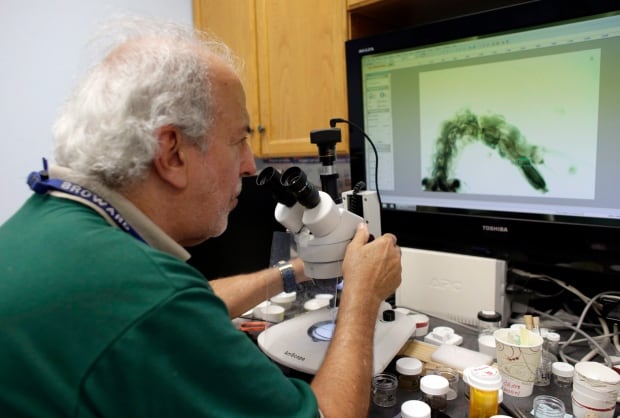Zika outbreak: Possible case from Florida mosquito investigated

Evaristo Miqueli, a natural resources officer in Florida, looks through a microscope at Aedes aegypti mosquito larvae in June in Florida. Health officials in the state are distributing Zika prevention kits and repellent. (Lynne Sladky/Associated Press)
The U.S. Centers for Disease Control and Prevention is working with Florida health officials to investigate what could be the first Zika infection from a mosquito in the continental United States.
They say lab tests confirm a person in the Miami area is infected with the Zika virus, and there may not be any connection to someone travelling outside the country.
The U.S. Centers for Disease Control and Prevention (CDC) says none of the more than 1,300 Zika infections in the United States to date were from local mosquitoes. Fourteen were sexually transmitted and one involved laboratory exposure.
Mosquito control inspectors were at work in Miami-Dade County on Wednesday. Spokeswoman Gayle Love said they’ve been going door-to-door since health authorities alerted them late last week, spraying to kill mosquitoes and emptying any containers because the insects like to lay eggs in and around standing water.
Tuesday’s statement from the Florida Department of Health did not specify whether the Zika case was believed to have been transmitted via mosquito bite, sexual contact or other means.
The department said the case was reported in Miami-Dade County and that it is working with the CDC on an epidemiological study.
The department also reiterated guidance to Florida residents on protecting themselves from mosquitoes that may carry the virus.
- Caregiver mysteriously gets Zika from man who died
- Go inside a Level 3 virus lab battling Zika
“Zika prevention kits and repellant will be available for pickup … and distributed in the area under investigation,” the Health Department said in a statement. Zika kits are intended for pregnant women.
Zika, which can cause a rare birth defect and other neurological conditions, has spread rapidly through the Americas.
There has yet to be a case of local transmission by mosquitoes in the continental United States.
U.S. officials have predicted local outbreaks to begin as the weather warms, particularly in southern states such as Florida and Texas.
- Canadian mosquito tests for Zika virus transmission begin
- CBC IN BRAZIL | Entomologists gather in Brazil to stop Zika mosquito
There are three steps in local transmission:
- Someone who is infected with Zika while travelling and has high enough level of the virus returns home to the U.S.
- The person then gets bitten by a local mosquito that is able to carry the Zika virus.
- The local mosquito then bites and infects someone else.
Experts with the CDC have previously said if local spread of the virus occurs in the U.S., it is not likely to be as widespread as in Latin America and Caribbean.
They point to what happened when Aedes mosquitoes spread dengue and chikungunya, cousins of Zika virus. Locally transmitted outbreaks of dengue occurred in Florida, Hawaii and Texas. In 2014, there were 12 cases of locally acquired chikungunya reported in Florida, the CDC said.
In the continental U.S., greater use of air conditioning, window screens, mosquito control, and less densely populated areas than in Central and South America are all thought to lessen the likelihood of widespread outbreaks, CDC officials have said.